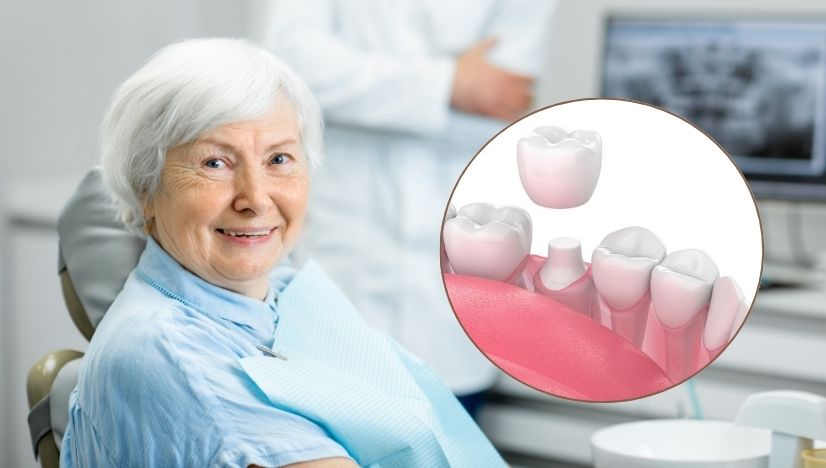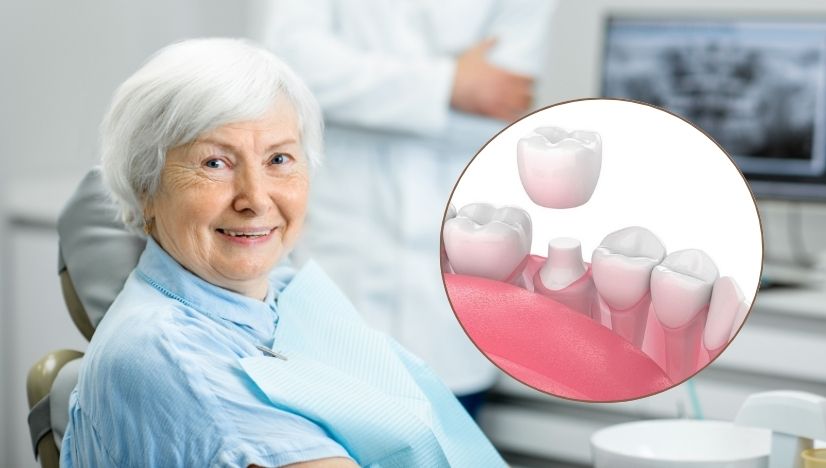Dental Crowns For Seniors: Addressing Age-Related Tooth Damage

As we age, our teeth undergo natural wear and tear, often leading to cracks, decay, and sensitivity. For seniors, this can result in difficulties with chewing, speaking, and maintaining a beautiful smile.
Fortunately, dental crowns provide an effective solution to restore and protect aging teeth. This blog will explore how dental crowns can address age-related tooth damage, the different types of crowns available, and the benefits they offer to seniors.
The Age-Related Tooth Damage
Our teeth are designed to last a lifetime, but over the years, various factors can compromise their structure and function. Age-related tooth damage often includes:
- Tooth Decay: The natural aging process can lead to weakened enamel, increasing the risk of cavities and decay.
- Cracks and Chips: Teeth may become brittle with age, leading to cracks, chips, or fractures.
- Wear and Tear: Years of chewing, grinding, and biting take a toll, causing enamel to erode and teeth to become flattened.
- Sensitivity: Older adults may experience tooth sensitivity due to thinning enamel or gum recession.
These issues can affect your ability to eat and speak comfortably, impacting your overall quality of life. Dental crowns offer a reliable way to restore your teeth and prevent further damage.
Types of Dental Crowns for Seniors
When it comes to choosing the right dental crown, seniors have several options depending on their needs, preferences, and budget. Here are the most common types:
- Porcelain Crowns
- Appearance: Porcelain crowns closely mimic the appearance of natural teeth and are ideal for front teeth or visible areas.
- Durability: While highly aesthetic, porcelain can be more fragile than other materials, which makes it suitable for those with minimal tooth damage.
- Best For: Seniors who want a natural-looking smile.
- Appearance: Porcelain crowns closely mimic the appearance of natural teeth and are ideal for front teeth or visible areas.
- Porcelain-Fused-to-Metal Crowns (PFM)
- Appearance: These crowns combine the strength of metal with the natural appearance of porcelain. They offer a good balance of durability and aesthetics.
- Durability: PFM crowns are more durable than pure porcelain and are ideal for back teeth that endure more pressure from chewing.
- Best For: Seniors who need strength and aesthetics.
- Appearance: These crowns combine the strength of metal with the natural appearance of porcelain. They offer a good balance of durability and aesthetics.
- Metal Crowns (Gold or Silver)
- Appearance: Metal crowns, typically made from gold or other alloys, are the most durable option but are more noticeable due to their color.
- Durability: Metal crowns are highly resistant to wear and tear, making them an excellent choice for back teeth that endure intense pressure.
- Best For: Seniors who prioritize durability over appearance and want a long-lasting solution.
- Appearance: Metal crowns, typically made from gold or other alloys, are the most durable option but are more noticeable due to their color.
- Zirconia Crowns
- Appearance: Zirconia crowns are made from a strong ceramic material that offers both durability and a natural look.
- Durability: Zirconia is one of the most durable materials used for crowns, offering great strength without compromising aesthetics.
- Best For: Seniors who want a balance of appearance and longevity.
- Appearance: Zirconia crowns are made from a strong ceramic material that offers both durability and a natural look.
Benefits of Dental Crowns for Seniors
Dental crowns offer a range of benefits for seniors dealing with age-related tooth damage. Some of the key advantages include:
1. Restoration of Function
Dental crowns restore the function of damaged teeth, making it easier to chew and speak comfortably. Whether it’s a cracked tooth or severe decay, crowns help ensure that your teeth can withstand the pressures of daily use.
2. Better Aesthetics
For seniors concerned with the appearance of their teeth, dental crowns can improve the look of cracked, discolored, or misshapen teeth. Porcelain and zirconia crowns, in particular, offer a natural, aesthetically pleasing appearance.
3. Long-Lasting Durability
Dental crowns are designed to be durable and long-lasting, with many types lasting for 10-15 years or more with proper care. This makes them an ideal investment for seniors seeking a reliable solution to age-related tooth damage.
4. Protection Against Further Damage
Crowns protect weakened teeth from further deterioration. For example, a cracked tooth is vulnerable to breaking, but a crown covers and strengthens the tooth, preventing additional fractures or infection.
5. Comfort and Confidence
A well-fitted dental crown can provide relief from tooth sensitivity and discomfort. By restoring a damaged tooth, crowns help seniors regain confidence in their smile and improve their ability to eat and speak comfortably.
How Does The Dental Crown Procedure Work?
The process of getting a dental crown typically involves two visits to the dentist:
1. First Visit: Preparation and Impressions
During the first visit, the dentist will:
- Examine the damaged tooth and take X-rays to assess the extent of the damage.
- Remove any decayed or damaged portions of the tooth.
- Shape the remaining tooth structure to ensure the crown fits properly.
- Take impressions of the tooth to create a custom crown.
- Place a temporary crown to protect the tooth while the permanent crown is being made.
2. Second Visit: Placement of the Permanent Crown
Once the custom crown is ready, the patient returns for the second visit:
- The dentist will remove the temporary crown and fit the permanent crown.
- Adjustments are made to ensure the crown fits perfectly and the bite feels natural.
- The crown is cemented into place, and the procedure is complete.
Caring for Dental Crowns In Seniors
To ensure the longevity of dental crowns, seniors should take care of them just like natural teeth. Here are a few tips for maintaining crowns:
- Brush and Floss Regularly: Use a soft-bristled toothbrush and fluoride toothpaste to clean your crowns. Floss carefully around the edges to avoid plaque buildup.
- Avoid Hard Foods: While crowns are durable, it’s best to avoid hard foods like ice or sticky candies, which can damage the crown.
- Regular Dental Checkups: Visit our dentist regularly for checkups and cleanings to ensure your crowns remain in good condition.
- Wear a Mouthguard if Necessary: If you grind your teeth at night, our dentist may recommend a nightguard to protect your crowns.
A Vital Dental Option for Seniors!
Dental crowns are an excellent solution for seniors dealing with age-related tooth damage. They restore function, improve appearance, and provide long-lasting protection for teeth that have been compromised by decay, cracks, or wear.
With various materials available to suit different needs, crowns offer a personalized approach to restoring your smile. By investing in dental crowns, seniors can maintain their oral health, protect their teeth, and enjoy a comfortable, confident smile. If you’re considering dental crowns, talk to our dentist about the best option for your specific needs. With proper care and regular checkups, dental crowns can provide the stability and protection your teeth need as you age.
